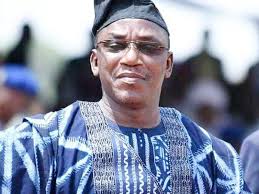Former Minister of Sports and Youth Development, Solomon Dalung, has warned that growing dissatisfaction among Nigerians could lead to a major political shift against President Bola Tinubu ahead of the 2027 elections. He pointed to increasing defections to the Social Democratic Party (SDP) as a sign of widespread discontent, particularly in the North.

Reasons for Joining SDP
Dalung, who previously served in the All Progressives Congress (APC) campaign council for Tinubu’s presidential bid, said he left the party after realizing Tinubu lacked a clear vision for leadership. He noted that after meeting Tinubu for 30 minutes, he felt the president was unable to grasp key issues. Having previously campaigned for Muhammadu Buhari, he said he could not continue supporting a government that failed to deliver for Nigerians.
After assessing political parties, he found the SDP most aligned with his vision for change. He contested the 2023 National Assembly election under the SDP but lost in what he described as a flawed process. Despite his grievances with the electoral commission, he chose not to challenge the results in court, doubting the credibility of the judicial process.
Mass Defections and Growing Support for SDP
Dalung confirmed that former government officials, including ex-ministers and senators, are in discussions to join the SDP. He attributed this shift to a belief that the party represents justice and fairness, recalling its role in the historic 1993 elections where MKO Abiola won in a widely accepted but annulled election.
He also called for the Nigerian government to formally recognize Abiola as a past president, declare the official election results, and compensate his family for the injustice.
Tinubu’s Governance and Economic Policies
Dalung criticized Tinubu’s approach to governance, particularly the removal of fuel subsidies immediately after taking office. He argued that the decision, made before forming a full government, triggered economic hardship and deepened public frustration. Despite calls for policy reconsideration, Tinubu maintained that he had no regrets, which Dalung described as a declaration of war against ordinary Nigerians.
According to Dalung, Tinubu has failed to unify the country or gain legitimacy as a leader. Unlike past presidents who sought to build national unity, Tinubu has alienated key political groups, including those who initially supported his candidacy.
Discontent in the North and Political Realignment
Dalung dismissed claims that northern political leaders are conspiring against Tinubu, insisting that dissatisfaction is widespread across Nigeria. He argued that hunger, unemployment, and economic hardship have made citizens lose faith in democracy. He predicted that Nigerians, rather than opposition parties, would be the driving force behind a potential political upset in 2027.
He also criticized attempts by Tinubu’s allies, including his wife, to win over northern Christians by portraying the president as their leader after being allegedly rejected by northern Muslims. Dalung called this strategy hypocritical, questioning the moral grounds for supporting a government they previously opposed on religious grounds.
Political Future and 2027 Elections
Dalung suggested that Tinubu’s prospects for re-election are uncertain, citing past instances where Nigerian leaders were removed due to governance failures. He warned that unless Tinubu changes his approach, he could face a similar fate.
He dismissed suggestions that selecting a Christian vice-presidential candidate in 2027 would change public perception, arguing that such a move would expose Tinubu as a leader willing to manipulate religious sentiment for political gain. Instead, he called for a united effort among Nigerians to demand better leadership, regardless of political affiliations.
Dalung concluded that the 2027 election will not be about political parties but about Nigerians choosing an alternative that can address their struggles.